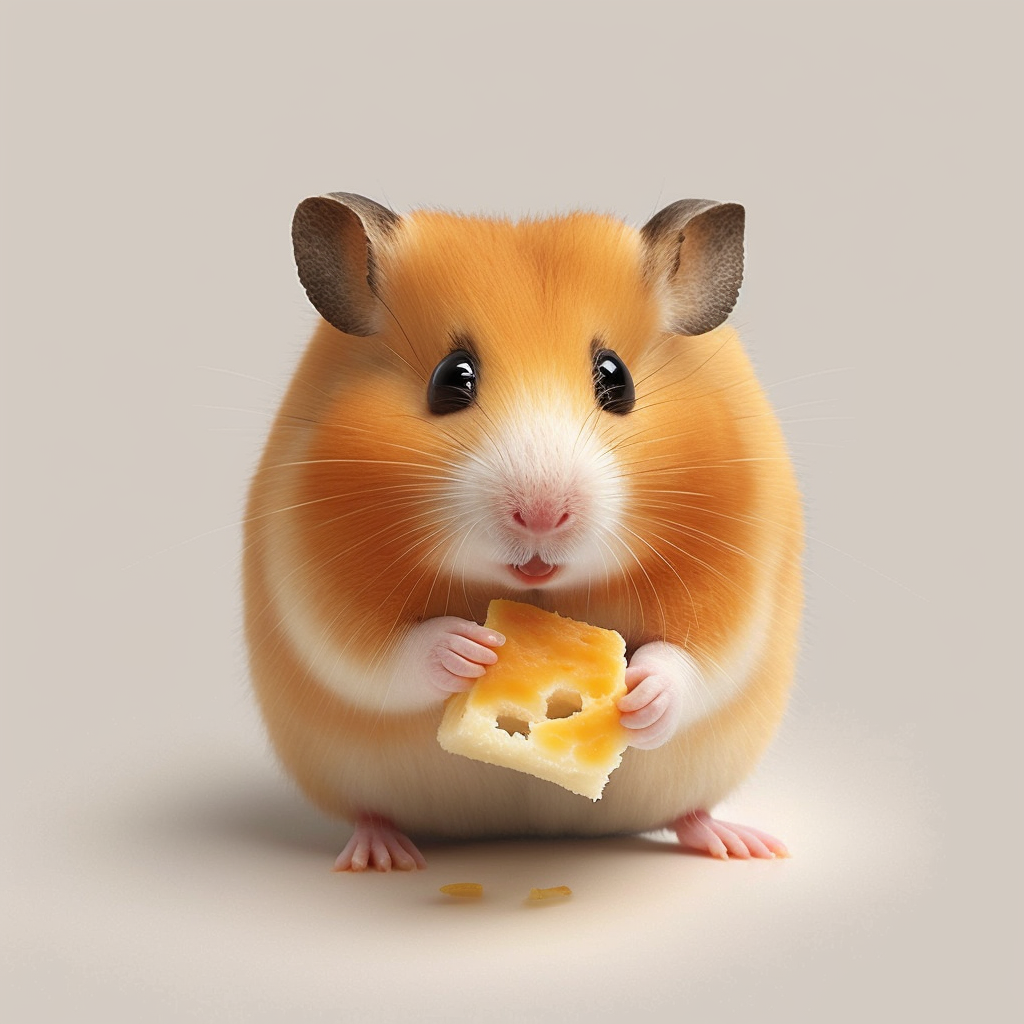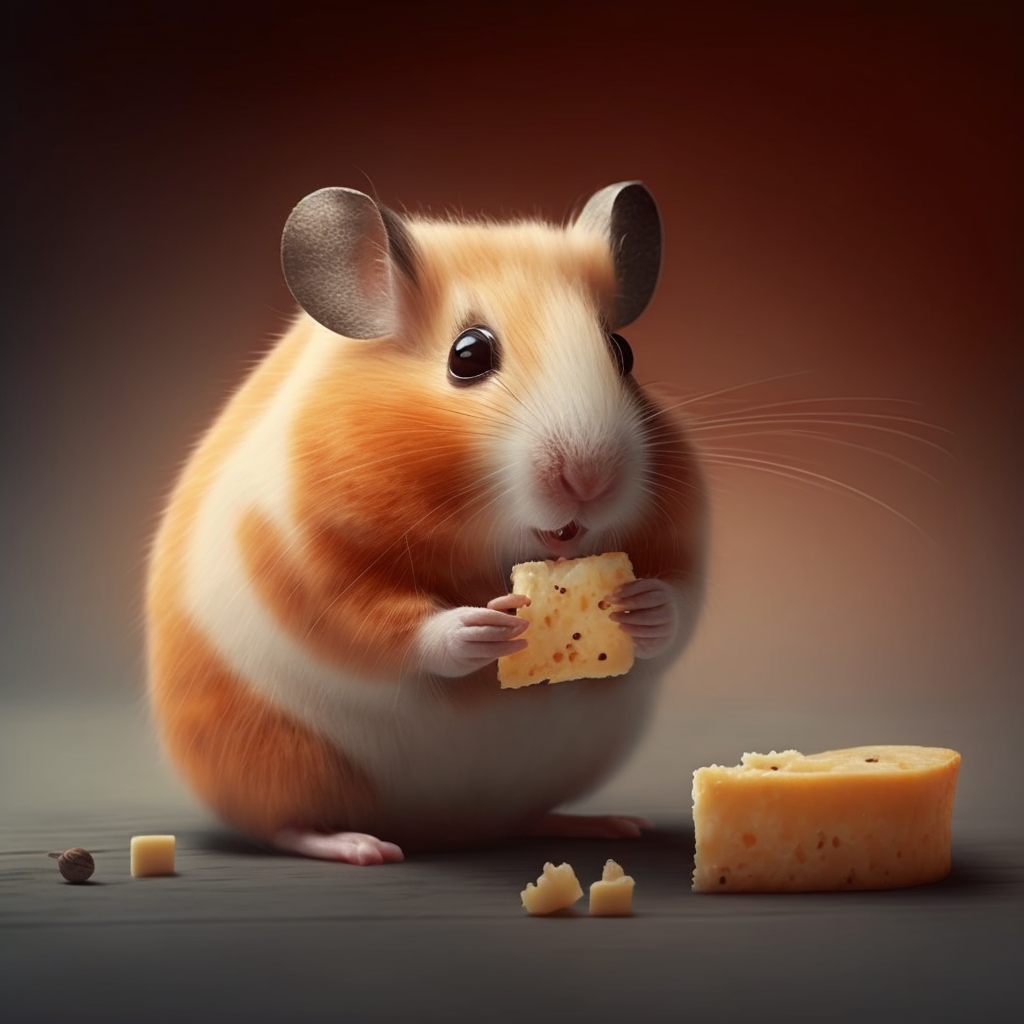Hamsters are cute, cuddly, and loveable pets that bring joy to many people’s lives. These small animals have unique dietary needs that require careful attention to keep them healthy and happy. As a responsible pet owner, it is essential to know what foods are safe for your hamster to eat and which ones to avoid. One common question that many people ask is, “can hamsters eat cheese?” In this guide, we will explore the topic of feeding cheese to hamsters and provide you with all the information you need to know.
Table of Contents
Hamster Nutrition 101
Before we dive into the topic of cheese and hamsters, it’s essential to understand what hamsters need in their diet. Hamsters are omnivores, which means they eat both plants and meat. In the wild, hamsters primarily eat seeds, grains, and insects. As a pet owner, it is essential to provide your hamster with a balanced diet that includes all the essential nutrients they need to stay healthy.

Click here to learn about how much food a hamster should eat.
A hamster’s diet should consist of:
High-quality hamster food: This food contains a balanced mix of grains, seeds, and other essential nutrients.
Fresh fruits and vegetables: These provide important vitamins and minerals that hamsters need to maintain good health.
Protein: Hamsters need protein to build and repair muscles. Protein sources can include cooked meats, boiled eggs, and insects like crickets or mealworms.
Water: Hamsters need fresh, clean water to stay hydrated.
Nutrients to Avoid
While it’s important to provide your hamster with a variety of nutritious foods, there are certain nutrients that they should avoid. Hamsters have sensitive digestive systems and can suffer from health problems if they consume the wrong foods. Some nutrients to avoid include:
Sugars: Too much sugar can lead to obesity and other health problems in hamsters.
Fats: High-fat foods can also lead to obesity and other health problems.
Processed foods: Hamsters should avoid highly processed foods that contain preservatives and other artificial additives.
Cheese and Hamsters: The Facts
Now that we understand what hamsters need in their diet, let’s explore the question of whether or not hamsters can eat cheese. Cheese is a dairy product that is made from milk. It comes in many different varieties, including cheddar, mozzarella, and brie. So, can hamsters eat cheese? The answer is yes, but there are a few things to keep in mind.
What Kind of Cheese Can Hamsters Eat?
Hamsters can eat most types of cheese, but some are better than others. Soft cheeses like brie and camembert are high in fat and should be avoided. Hard cheeses like cheddar and parmesan are lower in fat and are a better choice. It’s important to note that cheese should only be given to hamsters in small amounts as a treat, not as a regular part of their diet.
How Much Cheese is Safe for Hamsters to Eat?
While hamsters can eat cheese, it’s essential to feed it to them in moderation. Cheese is high in fat and calories, which can lead to obesity and other health problems if consumed in large amounts. As a general rule, hamsters should only be given a small piece of cheese once or twice a week.
Health Benefits of Cheese for Hamsters
While cheese should only be given to hamsters in small amounts, it does have some health benefits. Cheese is an excellent source of calcium, which is essential for healthy bones and teeth. Calcium deficiency can lead to weak bones and dental problems in hamsters, so it’s important to make sure they get enough calcium in their diet. Cheese is also a good source of protein, which is important for muscle growth and repair. Hamsters need protein to maintain their energy levels and stay active. Adding small amounts of cheese to your hamster’s diet can help ensure they get enough of these important nutrients.
Risks of Feeding Cheese to Hamsters
While cheese can provide some health benefits for hamsters, it’s important to be aware of the potential risks. Cheese contains lactose, which is a sugar found in milk. Some hamsters may be lactose intolerant, which means they can’t digest lactose properly. This can lead to digestive problems like diarrhea, bloating, and gas. If you notice any signs of digestive distress after feeding your hamster cheese, stop giving it to them immediately.
Cheese is also high in fat, which can lead to obesity and other health problems if consumed in large amounts. Hamsters are small animals, and even a small amount of extra weight can have a significant impact on their health. As mentioned earlier, cheese should only be given to hamsters in small amounts as a treat, not as a regular part of their diet.
Other Treats for Hamsters
While hamsters can enjoy a small amount of cheese as a treat, it’s important to provide them with other nutritious treats as well. Fresh fruits and vegetables are an excellent source of vitamins and minerals that hamsters need to stay healthy. Some safe options include:
- Carrots
- Broccoli
- Apples
- Bananas
- Grapes
- Blueberries
You can also provide your hamster with other sources of protein, like cooked chicken or boiled eggs. Just make sure to remove any bones or shell before feeding it to them.
How to Feed Your Hamster Cheese
If you decide to give your hamster a small piece of cheese as a treat, there are a few things to keep in mind. First, make sure the cheese is fresh and free from any mold or spoilage. Second, only give your hamster a small amount of cheese, about the size of a pea. Finally, watch your hamster carefully after giving them cheese to make sure they don’t have any adverse reactions.
When introducing new foods to your hamster, it’s important to do so gradually. Start with a small piece of cheese and watch for any signs of digestive distress. If your hamster tolerates the cheese well, you can slowly increase the amount over time. Always remember that cheese should only be given to hamsters in moderation as a treat, not as a regular part of their diet.
Conclusion
In conclusion, hamsters can eat cheese, but it should only be given to them in small amounts as a treat. Cheese is a good source of calcium and protein, but it is also high in fat and can lead to health problems if consumed in large amounts. As a responsible pet owner, it’s essential to provide your hamster with a balanced diet that includes all the essential nutrients they need to stay healthy. Fresh fruits and vegetables, along with small amounts of protein and treats like cheese, can help keep your furry friend happy and healthy for years to come.
Frequently Asked Questions
Q: Can hamsters eat any type of cheese?
A: While hamsters can eat some types of cheese, it’s best to stick with milder varieties like cheddar or mozzarella. Stronger cheeses like blue cheese or feta can be too rich for hamsters and may cause digestive problems.
Q: How much cheese can I give my hamster?
A: Only give your hamster a small amount of cheese, about the size of a pea. Cheese should only be given as an occasional treat, not as a regular part of their diet.
Q: Can lactose intolerant hamsters eat cheese?
A: No, hamsters that are lactose intolerant should not eat cheese. Lactose intolerance can cause digestive problems like diarrhea and gas.
Q: What are some other treats I can give my hamster besides cheese?
A: Fresh fruits and vegetables are excellent treats for hamsters. Safe options include carrots, broccoli, apples, bananas, grapes, and blueberries. You can also give your hamster small amounts of cooked chicken or boiled eggs.
Q: How often can I give my hamster cheese?
A: Cheese should only be given as an occasional treat, not as a regular part of their diet. Once or twice a week is a good guideline for giving your hamster cheese.
Q: Can cheese be harmful to hamsters?
A: Cheese can be harmful to hamsters if given in large amounts or if your hamster is lactose intolerant. Cheese is also high in fat, which can lead to obesity and other health problems if consumed in large quantities.
In this guide, we will explore the topic of feeding cheese to hamsters and provide you with all the information you need to know.

